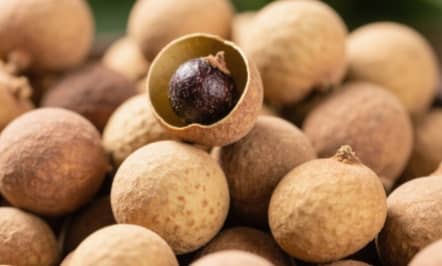Peel off the shell of a longan, remove the thin skin, and you’ll find its juicy, translucent flesh — known as longan pulp or guiyuan. Though small and sweet, this little fruit is both a traditional food and a time-honored medicine. But do you really know what it does to your body?

Table of Contents
- Origin and Processing
- Nature, Taste & Meridians
- Medicinal Properties & TCM Benefits
- Nutritional Value & Daily Use
- Contraindications & Warnings
1. Origin and Processing
Longan (Dimocarpus longan) belongs to the soapberry family and grows on the longan tree.
Once harvested, the fresh fruit — commonly known as longan — can be sun-dried to become guiyuan, or dried longan pulp.
🔍 The high-quality dried pulp is:
- Thick and fleshy
- Soft in texture
- Semi-transparent with a brownish-yellow hue
- Sweet and aromatic
🌿 Fresh longan and dried longan come from the same plant, but differ in form and nutrients:
- Fresh longan is rich in vitamins and minerals
- Dried longan (guiyuan) contains more sugar and calories
2. Nature, Taste & Meridians
📌 Taste: Sweet
📌 Nature: Warm
📌 Meridians: Heart and Spleen
In TCM, longan pulp nourishes both yin of the Heart and yang of the Spleen, supporting mental clarity and emotional balance. It’s considered gentle and nourishing, making it ideal for those with deficiency-type patterns.
3. Medicinal Properties & TCM Benefits
✅ Tonifies the Heart and Spleen: Ideal for fatigue, palpitations, and poor appetite
✅ Replenishes Qi and Blood: Used in anemia, postpartum recovery, and dizziness
✅ Calms the mind and supports memory: Helpful for insomnia, excessive dreaming, and forgetfulness
📖 Compendium of Materia Medica states:
“Stimulates appetite, strengthens the Spleen, nourishes deficiency, and enhances intelligence.”
TCM theory explains this by saying:
- The Heart governs the spirit (Shen) and is linked to thought
- The Spleen governs intention (Yi) and supports cognition
Thus, longan pulp nourishes both the source of thought and the seat of memory.
4. Nutritional Value & Daily Use
Longan pulp isn’t just a medicinal tonic — it can also be used in daily cuisine:
🍵 Common preparations:
- Soaked in warm water as tea
- Stewed with red dates or goji berries
- Cooked in congee or dessert soups
🍯 Nutritional Highlights:
- High in natural sugars for quick energy
- Contains iron, potassium, and antioxidants
- Popular for postpartum nourishment and mental fatigue
5. Contraindications & Warnings
⚠️ Not everyone should consume longan pulp regularly:
🚫 Those with internal heat, dampness, or phlegm accumulation should use caution
🚫 Pregnant women should avoid overconsumption due to its warming nature, which may lead to:
- Dry stools
- Yellow urine
- Mouth and tongue dryness
🌡️ In TCM, excessive warmth can aggravate fire and disturb internal balance, especially during sensitive stages like pregnancy.
✅ Conclusion
Longan pulp (guiyuan) is sweet, warming, and deeply nourishing — a classic example of a food-medicine in traditional Chinese culture. It strengthens the mind, boosts energy, and aids recovery. But its warming properties also mean it’s not suitable for everyone. Like all powerful remedies, it should be used wisely, based on your body’s needs.